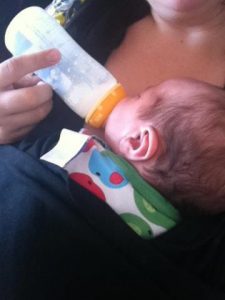Wondering If This Is Safe?

However, homemade infant formula might be hazardous to infants. Therefore, you should never manufacture a home-prepared formula on your own, and serve it to your child since it can cause serious, even fatal, health problems.
Your infant could become ill if home-prepared formula becomes contaminated. It could also be deficient in crucial nutrients your kid requires to develop and keep healthy. For example, the Food and Drug Administration (FDA) has received complaints of newborns who were fed home-prepared formula and required hospitalization for low calcium treatment.
Continue reading to learn more about the truth of do-it-your-own baby formula.
Formula Facts: The Dangers Of Homemade Formula For Babies
Infections And Contamination
- Contamination can occur when the homemade baby formula is prepared at home. For example, formulas using unpasteurized raw cow or goat milk may cause diseases such as Salmonella or E. coli.
- Raw milk that has not undergone pasteurization to kill harmful bacteria can cause serious diseases.
- It is better to consult a pediatrician than risk your child’s health upon using a raw cow’s milk formula from a raw milk formula recipe.
Excess Nutrient Intake
- Particular nutrients may be in excess in some formulas.
- For example, too much salt or protein can be difficult on an infant’s kidneys.
Deficiencies In Nutrients
- Home-prepared baby formula may lack essential elements like protein, vitamins, and minerals.
- For example, vegan and dairy-free formula types do not provide adequate calcium, resulting in eating issues, irritability, and seizures.
Poor Development And Learning Problems
- These can occur when an infant does not receive adequate nutrients over time.
Contact your doctor immediately if you are the parent or caregiver of an infant experiencing symptoms after consuming home-prepared formula for babies.

Why Can’t I Make My Baby Formula Or Homemade Infant Formula?
Once customary, feeding newborns ordinary milk or homemade formula is no longer safe or advised. In the U.S., all infant formula sold in stores must meet strict ingredient requirements to ensure healthy development.
The FDA oversees formula production and storage. In addition, the government inspects formulae and factories to prevent contamination and spoiling.
Online or other formula combinations may lack iron or vitamins. In addition, your baby’s kidneys and liver may not be able to manage too much sodium or other nutrients.
Typical dairy products like cow milk or substitutes like soy, hemp, or almond milk lack vital nutrients like protein, iron, calcium, and vitamins. In addition, chemical forms of nutrition may not even be easily digested by a baby’s body, even if the label says they have enough. Or, specific components (such as calcium and phosphorus) may interfere with bone formation.
Your child’s brain and body grow rapidly during the first year of life. Even a few days or weeks without enough formula can affect your baby’s ability to grow healthy and do well in the classroom. These nutrients can cause serious health problems and even death. Home-prepared formulations may be contaminated, induce illnesses, or have too much or too little calcium or salt.
What Makes Commercial Formula For Babies Safer Compared With Homemade Formula?
If you cannot nurse your infant or decide not to, commercial infant formula may be their only source of nutrition.
The FDA ensures that these items meet the most basic safety and nutritional standards. However, this does not apply to home-prepared infant formula recipes like those you might prepare or obtain online.
The FDA mandates commercial formula manufacturers to meet specific nutrient criteria. It establishes minimum and maximum requirements for 29 nutrients. Certain nutrients might harm your baby’s health if consumed excessively or insufficiently.
Nutritional deficiency can have long-term consequences, even if only for a few days or weeks. For example, it may reduce a baby’s chances of growing up robust and succeeding in school.
If a formula manufacturer fails to meet the FDA’s nutrition standards, the agency has the authority to remove the product from store shelves.
The agency also monitors how certified formulations are created and preserved. For example, it regularly inspects the formulations and the locations where they are manufactured. This way, they can ensure that manufacturers follow the standards to keep the formulations from becoming contaminated or rotting.
Options To Consider If There Is A Shortage Of Baby’s Formula
If there’s a shortage of infant formula on store shelves near you, try these tips from the American Academy of Pediatrics (AAP) in case you find yourself in an urgent situation:
- Call the WIC office in your area. In addition, you could look for formulas in several locations, according to the Special Supplemental Nutrition Program for Women, Infants, and Children (WIC).
- Consult your child’s physician. Avoid consuming homemade baby formula since this homemade formula may pose a risk to your infant. Ask your baby’s doctor to obtain a can of baby formula from local distributors or a charity that has some.
- Select any commercially available formula, even store brands. For the majority of babies, this is fine, except for those who are on a particular formula that the pediatrician advised (such as formulas that say “extensively hydrolyzed,” “predigested,” or “amino acid-based”). Ask your pediatrician for suggestions if your baby requires a specialist formula that you are having difficulties locating.
- Do not dilute the baby formula. Although you might believe that doing so will extend the life of your supply, it is unsafe to do so. It could upset your baby’s nutritional balance and result in critical health issues. Unless your pediatrician instructs you otherwise, always prepare infant formula according to the recommendations on the label.
- Check social media. Consult a group that is focused on formula and infant feeding. Its members might be able to suggest locations to buy formula. Consult your child’s pediatrician first if you receive this advice.
- Purchase online. If you can afford it, try this alternative. Buy only from pharmacies and distributors with a good reputation. Avoid buying in individual cans or on auction websites. Don’t purchase from abroad because the FDA does not inspect imported infant formula.
- Visit smaller supermarkets or pharmacies. They might carry formula when larger supermarkets don’t.

However, the AAP advises parents of babies over 6 months old to contact their pediatrician if it’s okay to momentarily give them cow’s milk in an emergency during a formula scarcity. This potential choice is only available to infants over 6 months old who typically consume standard formula and is not a specialty item for any medical requirements, such as allergies. Just like home-prepared formula, it’s not recommended to feed your child cow’s milk. It’s not recommended, and you shouldn’t do it frequently. However, according to the AAP, it’s preferable to produce homemade infant formula or water down pre-made infant food.
For those who have sensitivity to raw cow milk or any cow milk formula, you may opt for a goat’s milk formula. A goat’s milk formula can be a great alternative to cow’s milk. Despite goat’s milk popularity in most countries, be aware that it is not safe to be used for infants. Raw goat milk or goat milk formula can even cause significant morbidity and death in infants.
You can also bookmark the Family Hype page for the latest updates on baby formula milk resources.
Homemade Baby Formula FAQs
What Water Can I Use To Make Baby Formula?
When preparing your own formula or fed homemade infant formula, it’s important to follow the infant formula label guidelines and use water that is safe and suitable for mixing with milk substitutes to create your own infant formula.
Can Infants Survive Without Formula?
A board-certified pediatrician would advise that, while babies can survive without formula, as was common decades ago, doing so without proper guidance may lead to nutrient deficiencies and inadequate amounts of essential nutrients, potentially becoming life-threatening, hence the importance of finding local resources for safe feeding alternatives.
What Can I Give My Infant If I Have No Formula?
If you have no infant formula to give to your baby, you can go to the best and most natural way which is breast milk. A mother’s milk is still the best choice for your baby since it provides all the nutrients a baby needs without any side effects. A mother’s milk can help protect babies against short-term and long-term illnesses. You may also call your pediatrician if you don’t have an infant formula, they may help you get an infant formula that is suited for your baby. You may also look for infant formula at trusted grocery stores. There are a ton of infant formulas out there; just make sure to look for a powdered formula that is FDA-approved.
Infant formulas may include plant-based oils such as olive oil and coconut oil to mimic the fat profile included in breast milk. Coconut oil for instance is rich in fat which is why it is added in infant formulas. When it comes to olive oil, some countries recommend adding olive oil for babies who are experiencing constipation. Olive oil is also said to be good as a remedy for colic. Despite these claims, it is still better to consult a pediatrician before using coconut oil or olive oil in infant formulas.
How Do You Make A Baby Formula Or Infant Formula?
There are a lot of home-prepared infant formula recipes out there, despite the large number of information you can find online, not all of these recipes are safe. The FDA doesn’t advise parents to make home-prepared formulas, because most recipes have not been evaluated by the FDA. These home-prepared infant formula recipes may produce infant formulas that lack the nutrients needed by babies.
Can You Make Baby Formula With Evaporated Milk?
Yes, you may make a homemade formula using evaporated milk, but only if it’s necessary. If you’re planning to do this, be under the guidance of a physician since evaporated milk still has the same risks as goat’s milk and cow’s milk.
What Did Parents Do Before The Formula?
Before the advent of formula, ensuring proper nutrition and critical nutrients for healthy growth in hospitalized babies and others with specific nutritional needs was a challenge, as the alternatives were not strictly regulated like today’s infant formulas. Before the invention of commercial baby formula, parents primarily relied on breastfeeding to provide nutrition for infants. In cases where breastfeeding was not possible, wet nurses were often employed to feed the baby. Alternative feeding methods included homemade mixtures of cow’s milk, goat’s milk, or other milk substitutes, often diluted and sweetened. However, these methods were less nutritionally complete and posed higher health risks compared to modern formulas and breastfeeding.
How Did People Make Baby Formula In The 1950s?
In the 1950s, when making baby formula, often the sole source of nutrition for infants, people typically used tap water and local resources, mixing ingredients in equal amounts, without the convenience of a microwave oven; however, this could lead to nutrient excesses or deficiencies, sometimes causing serious problems.
What Is Dry Nursing?
What Were Infants Fed In The 1950s?
Can I Give My Infant Milk Instead Of Formula?
Can Newborns Drink Evaporated Milk?
Can You Make Formula With Breast Milk?
What Milk Is Safe To Be Taken By Newborns?
Why Did Infants Drink Evaporated Milk?
Why Can’t Infants Drink Cold Formula?
Last Updated on May 16, 2023 by Rejie Salazar
DISCLAIMER (IMPORTANT): This information (including all text, images, audio, or other formats on FamilyHype.com) is not intended to be a substitute for informed professional advice, diagnosis, endorsement or treatment. You should not take any action or avoid taking action without consulting a qualified professional. Always seek the advice of your physician or other qualified health provider with any questions about medical conditions. Do not disregard professional medical advice or delay seeking advice or treatment because of something you have read here a FamilyHype.com.